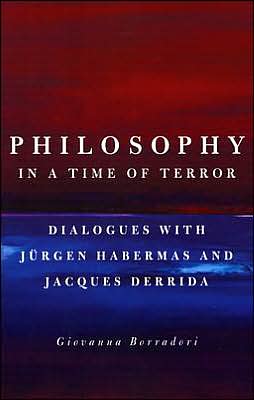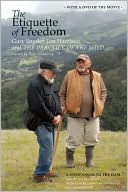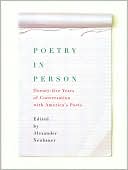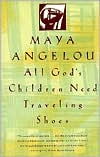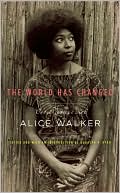Philosophy in a Time of Terror: Dialogues with Jurgen Habermas and Jacques Derrida
The idea for Philosophy in a Time of Terror was born hours after the attacks on 9/11 and was realized just weeks later when Giovanna Borradori sat down with Jurgen Habermas and Jacques Derrida in New York City, in separate interviews, to evaluate the significance of the most destructive terrorist act ever perpetrated. This book marks an unprecedented encounter between two of the most influential thinkers of our age as here, for the first time, Habermas and Derrida overcome their mutual...
Search in google:
The idea for Philosophy in a Time of Terror was born hours after the attacks on 9/11 and was realized just weeks later when Giovanna Borradori sat down with Jürgen Habermas and Jacques Derrida in New York City, in separate interviews, to evaluate the significance of the most destructive terrorist act ever perpetrated. This book marks an unprecedented encounter between two of the most influential thinkers of our age as here, for the first time, Habermas and Derrida overcome their mutual antagonism and agree to appear side by side. As the two philosophers disassemble and reassemble what we think we know about terrorism, they break from the familiar social and political rhetoric increasingly polarized between good and evil. In this process, we watch two of the greatest intellects of the century at work.Library JournalMany assumptions about politics were destroyed along with the World Trade Center, and Borradori (philosophy, Vassar) seized the opportunity to ask Habermas and Derrida how their theories fared. These men represent two central strands of European philosophy-the one building on Enlightenment notions of universal rationality, the other suspicious of the commitments often hidden in its language. Borradori thinks their past writings show that both philosophers regard freedom as dependent on a caring society that provides the necessary conditions for action and oppose the tradition that sees freedom as dependent only on philosophical clarity and the absence of restraint. In these interviews, Habermas and Derrida do mention the underlying economic issues-globalization and the search for mastery over the world's oil supplies. But Habermas sees the outbreak of terror mainly as a failure of communications, and Derrida sees it above all as a failure to develop a concept of world hospitality to replace what he thinks is the outmoded Christian notion of a toleration that is really only charity. Despite their theoretical convictions, they seem here to see the problems more as philosophical than as a failure to integrate economics and the social sciences or develop a strategy against misery and poverty. This is a book without jargon or technicalities that should have a place in all large collections.-Leslie Armour, Univ. of Ottawa Copyright 2003 Reed Business Information.
\ Philosophy in a Time of Terror\ \ \ \ Dialogues with Jurgen Habermas and Jacques Derrida\ \ \ \ By Giovanna Borradori\ \ \ University of Chicago Press\ \ \ Copyright © 2003\ \ \ University of Chicago\ All right reserved.\ \ ISBN: 0-226-06664-9\ \ \ \ \ \ Chapter One\ \ \ FUNDAMENTALISM AND TERROR\ A Dialogue with Jurgen Habermas\ Borradori: Do you consider what we now tend to call "September 11" an\ unprecedented event, one that radically alters the way we see ourselves?\ Habermas: Allow me to say in advance that I shall be answering your\ questions at a distance of three months. Therefore, it might be useful to\ mention my personal experience in relation to the event. At the start of\ October I was beginning a two-month stay in Manhattan. I must confess I\ somehow felt more of a stranger this time than I did on previous visits to\ the "capital of the twentieth century," a city that has fascinated me for\ more than three decades. It was not only the flag-waving and rather\ defiant "United We Stand" patriotism that had changed the climate, nor was\ it the peculiar demand for solidarity and the accompanying susceptibility\ to any presumed "anti-Americanism." The impressive American liberality\ toward foreigners, the charm of the eager, sometimes also self-consciously\ accepting embrace-thisnoble openhearted mentality seemed to have given\ way to a slight mistrust. Would we, the ones who had not been present, now\ also stand by them unconditionally? Even those who hold an unquestionable\ record, as I do among my American friends, needed to be cautious with\ regard to criticism. Since the intervention in Afghanistan, we suddenly\ began to notice when, in political discussions, we found ourselves only\ among Europeans (or among Israelis).\ On the other hand, only there did I first feel the full magnitude of the\ event. The terror of this disaster, which literally came bursting out of\ the blue, the horrible convictions behind this treacherous assault, as\ well as the stifling depression that set over the city, were a completely\ different experience there than at home. Every friend and colleague could\ remember exactly what they were doing that day shortly after 9:00 A.M. In\ short, only there did I begin to better comprehend the foreboding\ atmosphere that already echoes in your question. Also among the left there\ is a widespread awareness of living at a turning point in history. I do\ not know whether the U.S. government itself was slightly paranoid or\ merely shunning responsibility. At any rate, the repeated and utterly\ nonspecific announcements of possible new terror attacks and the senseless\ calls to "be alert" further stirred a vague feeling of angst along with an\ uncertain readiness-precisely the intention of the terrorists. In New York\ people seemed ready for the worst. As a matter of course, the anthrax\ scares (even the plane crash in Queens)2 were attributed to Osama bin\ Laden's diabolical machinations.\ Given this background, you can understand a certain tendency toward\ skepticism. But is what we contemporaries think at the moment that\ important for a long-term diagnosis? If the September 11 terror attack is\ supposed to constitute a caesura in world history, as many think, then it\ must be able to stand comparison to other events of world historical\ impact. For that matter, the comparison is not to be drawn with Pearl\ Harbor but rather with the aftermath of August 1914. The outbreak of World\ War I signaled the end of a peaceful and, in retrospect, somewhat\ unsuspecting era, unleashing an age of warfare, totalitarian oppression,\ mechanistic barbarism and bureaucratic mass murder. At the time, there was\ something like a widespread foreboding. Only in retrospect will we be able\ to understand if the symbolically suffused collapse of the capitalistic\ citadels in lower Manhattan implies a break of that type or if this\ catastrophe merely confirms, in an inhuman and dramatic way, a long known\ vulnerability of our complex civilization. If an event is not as\ unambiguously important as the French Revolution once was-not long after\ that event Kant had spoken about a "historical sign" that pointed toward a\ "moral tendency of humankind"-only "effective history" can adjudicate its\ magnitude in retrospect.\ Perhaps at a later point important developments will be traced back to\ September 11. But for now we do not know which of the many scenarios\ depicted today will actually hold in the future. The clever, albeit\ fragile, coalition against terrorism brought together by the U.S.\ government might, in the most favorable case, be able to advance the\ transition from classical international law to a cosmopolitan order. At\ all events, a hopeful signal was the Afghanistan conference in Bonn,\ which, under the auspices of the UN, set the agenda in the right\ direction. However, after September 11 the European governments have\ completely failed. They are obviously incapable of seeing beyond their own\ national scope of interests and lending at least their support to the U.S.\ Secretary of State Colin Powell against the hard-liners. The Bush\ administration seems to be continuing, more or less undisturbed, the\ self-centered course of a callous superpower. It is fighting now as it has\ in the past against the appointment of an international criminal court,\ relying instead on military tribunals of its own. These constitute, from\ the viewpoint of international law, a dubious innovation. It refuses to\ sign the Biological Weapons Convention. It one-sidedly terminated the ABM\ Treaty and absurdly sees its plan to deploy a missile defense system\ validated by the events of September 11. The world has grown too complex\ for this barely concealed unilateralism. Even if Europe does not rouse\ itself to play the civilizing role, as it should, the emerging power of\ China and the waning power of Russia do not fit into the pax Americana\ model so simply. Instead of the kind of international police action that\ we had hoped for during the war in Kosovo, there are wars again-conducted\ with state-of-the-art technology but still in the old style.\ The misery in war-torn Afghanistan is reminiscent of images from the\ Thirty Years' War. Naturally there were good reasons, even normative ones,\ to forcibly remove the Taliban regime, which brutally oppressed not only\ women but the entire population. They also refused the legitimate demand\ to hand over bin Laden. However, the asymmetry between the concentrated\ destructive power of the electronically controlled clusters of elegant and\ versatile missiles in the air and the archaic ferocity of the swarms of\ bearded warriors outfitted with Kalashnikovs on the ground remains a\ morally obscene sight. This feeling is more properly understood when one\ recalls the bloodthirsty colonial history that Afghanistan suffered, its\ arbitrary geographic cutting up, and its continued instrumentalization at\ the hands of the European power play. In any case, the Taliban regime\ already belongs to history.\ Borradori: True, but our topic is terrorism, which seems to have taken up\ new meaning and definition after September 11th.\ Habermas: The monstrous act itself was new. And I do not just mean the\ action of the suicide hijackers who transformed the fully fueled airplanes\ together with their hostages into living weapons, or even the unbearable\ number of victims and the dramatic extent of the devastation. What was new\ was the symbolic force of the targets struck. The attackers did not just\ physically cause the highest buildings in Manhattan to collapse; they also\ destroyed an icon in the household imagery of the American nation. Only in\ the surge of patriotism that followed did one begin to recognize the\ central importance the towers held in everyone's imagination, with their\ irreplaceable imprint on the Manhattan skyline and their powerful\ embodiment of economic strength and projection toward the future. The\ presence of cameras and of the media was also new, transforming the local\ event simultaneously into a global one and the whole world population into\ a benumbed witness. Perhaps September 11 could be called the first\ historic world event in the strictest sense: the impact, the explosion,\ the slow collapse-everything that was not Hollywood anymore but, rather, a\ gruesome reality, literally took place in front of the "universal\ eyewitness" of a global public. God only knows what my friend and\ colleague experienced, watching the second airplane explode into the top\ floors of the World Trade Center only a few blocks away from the roof of\ his house on Duane Street. No doubt it was something completely different\ from what I experienced in Germany in front of the television, though we\ saw the same thing.\ Certainly, no observation of a unique event can provide an explanation per\ se for why terrorism itself should have assumed a new characteristic. In\ this respect one factor above all seems to me to be relevant: one never\ really knows who one's enemy is. Osama bin Laden, the person, more likely\ serves the function of a stand-in. Compare the new terrorists with\ partisans or conventional terrorists, for example, in Israel. These people\ often fight in a decentralized manner in small, autonomous units, too.\ Also, in these cases there is no concentration of forces or central\ organization, a feature that makes them difficult targets. But partisans\ fight on familiar territory with professed political objectives in order\ to conquer power. This is what distinguishes them from terrorists who are\ scattered around the globe and networked in the fashion of secret\ services. They allow their religious motives of a fundamentalist kind to\ be known, though they do not pursue a program that goes beyond the\ engineering of destruction and insecurity. The terrorism we associate for\ the time being with the name "al-Qaeda" makes the identification of the\ opponent and any realistic assessment of the danger impossible. This\ intangibility is what lends terrorism a new quality.\ Surely the uncertainty of the danger belongs to the essence of terrorism.\ But the scenarios of biological or chemical warfare painted in detail by\ the American media during the months after September 11, the speculations\ over the various kinds of nuclear terrorism, only betray the inability of\ the government to at least determine the magnitude of the danger. One\ never knows if there's anything to it. In Israel people at least know what\ can happen to them if they take a bus, go into a department store,\ discotheque, or any open area-and how frequently it happens. In the U.S.A.\ or Europe one cannot circumscribe the risk; there is no realistic way to\ estimate the type, magnitude, or probability of the risk, nor any way to\ narrow down the potentially affected regions.\ This brings a threatened nation, which can react to such uncertain dangers\ solely through administrative channels, to the truly embarrassing\ situation of perhaps overreacting and, yet, because of the inadequate\ level of secret intelligence, remaining unable to know whether or not it\ is in fact overreacting. Because of this, the state is in danger of\ falling into disrepute due to the evidence of its inadequate resources:\ both domestically, through a militarizing of the security measures, which\ endanger the constitutional state, and internationally, through the\ mobilization of a simultaneously disproportionate and ineffective military\ and technological superiority. With transparent motives, U.S. Defense\ Secretary Donald Rumsfeld warned again of unspecified terror threats at\ the NATO conference in Brussels in mid-December: "When we look at the\ destruction they caused in the U.S.A., imagine what they could do in New\ York, or London, or Paris, or Berlin with nuclear, chemical or biological\ weapons." Of a wholly different kind were the measures-necessary and\ prudent, but only effective in the long term-the U.S. government took\ after the attack: the creation of a worldwide coalition of countries\ against terrorism, the effective control over suspicious financial flows\ and international bank associations, the networking of relevant\ information flows among national intelligence agencies, as well as the\ worldwide coordination of corresponding police investigations.\ * * *\ Borradori: Philosophically speaking, do you consider terrorism to be a\ wholly political act?\ Habermas: Not in the subjective sense in which Mohammed Atta, the Egyptian\ citizen who came from Hamburg and piloted the first of the two\ catastrophic airplanes, would offer you a political answer. No doubt\ today's Islamic fundamentalism is also a cover for political motifs.\ Indeed, we should not overlook the political motifs we encounter in forms\ of religious fanaticism. This explains the fact that some of those drawn\ into the "holy war" had been secular nationalists only a few years before.\ If one looks at the biographies of these people, remarkable continuities\ are revealed. Disappointment over nationalistic authoritarian regimes may\ have contributed to the fact that today religion offers a new and\ subjectively more convincing language for old political orientations.\ Borradori: How would you actually define terrorism? Can a meaningful\ distinction be drawn between national and international or even global\ terrorism?\ Habermas: In one respect, Palestinian terrorism still possesses a certain\ outmoded characteristic in that it revolves around murder, around the\ indiscriminate annihilation of enemies, women, and children-life against\ life. This is what distinguishes it from the terror that appears in the\ paramilitary form of guerilla warfare. This form of warfare has\ characterized many national liberation movements in the second half of the\ twentieth century-and has left its mark today on the Chechnyan struggle\ for independence, for example. In contrast to this, the global terror that\ culminated in the September 11 attack bears the anarchistic traits of an\ impotent revolt directed against an enemy that cannot be defeated in any\ pragmatic sense. The only possible effect it can have is to shock and\ alarm the government and population. Technically speaking, since our\ complex societies are highly susceptible to interferences and accidents,\ they certainly offer ideal opportunities for a prompt disruption of normal\ activities. These disruptions can, at a minimum expense, have considerably\ destructive consequences. Global terrorism is extreme both in its lack of\ realistic goals and in its cynical exploitation of the vulnerability of\ complex systems.\ Borradori: Should terrorism be distinguished from ordinary crimes and\ other types of violence?\ Habermas: Yes and no. From a moral point of view, there is no excuse for\ terrorist acts, regardless of the motive or the situation under which they\ are carried out. Nothing justifies our "making allowance for" the murder\ or suffering of others for one's own purposes. Each murder is one too\ many. Historically, however, terrorism falls in a category different from\ crimes that concern a criminal court judge.\ \ Continues...\ \ \ \ \ \ \ Excerpted from Philosophy in a Time of Terror\ by Giovanna Borradori\ Copyright © 2003\ by University of Chicago.\ Excerpted by permission.\ All rights reserved. No part of this excerpt may be reproduced or reprinted without permission in writing from the publisher.\ Excerpts are provided by Dial-A-Book Inc. solely for the personal use of visitors to this web site.\ \ \
Preface: Philosophy in a Time of TerrorixAcknowledgementsxvIntroduction: Terrorism and the Legacy of the EnlightenmentHabermas and Derrida1Part 1Fundamentalism and TerrorA Dialogue with Jurgen Habermas25Reconstructing Terrorism-Habermas45Part 2Autoimmunity: Real and Symbolic SuicidesA Dialogue with Jacques Derrida85Deconstructing Terrorism-Derrida137Notes173Index199
\ Library JournalMany assumptions about politics were destroyed along with the World Trade Center, and Borradori (philosophy, Vassar) seized the opportunity to ask Habermas and Derrida how their theories fared. These men represent two central strands of European philosophy-the one building on Enlightenment notions of universal rationality, the other suspicious of the commitments often hidden in its language. Borradori thinks their past writings show that both philosophers regard freedom as dependent on a caring society that provides the necessary conditions for action and oppose the tradition that sees freedom as dependent only on philosophical clarity and the absence of restraint. In these interviews, Habermas and Derrida do mention the underlying economic issues-globalization and the search for mastery over the world's oil supplies. But Habermas sees the outbreak of terror mainly as a failure of communications, and Derrida sees it above all as a failure to develop a concept of world hospitality to replace what he thinks is the outmoded Christian notion of a toleration that is really only charity. Despite their theoretical convictions, they seem here to see the problems more as philosophical than as a failure to integrate economics and the social sciences or develop a strategy against misery and poverty. This is a book without jargon or technicalities that should have a place in all large collections.-Leslie Armour, Univ. of Ottawa Copyright 2003 Reed Business Information.\ \
